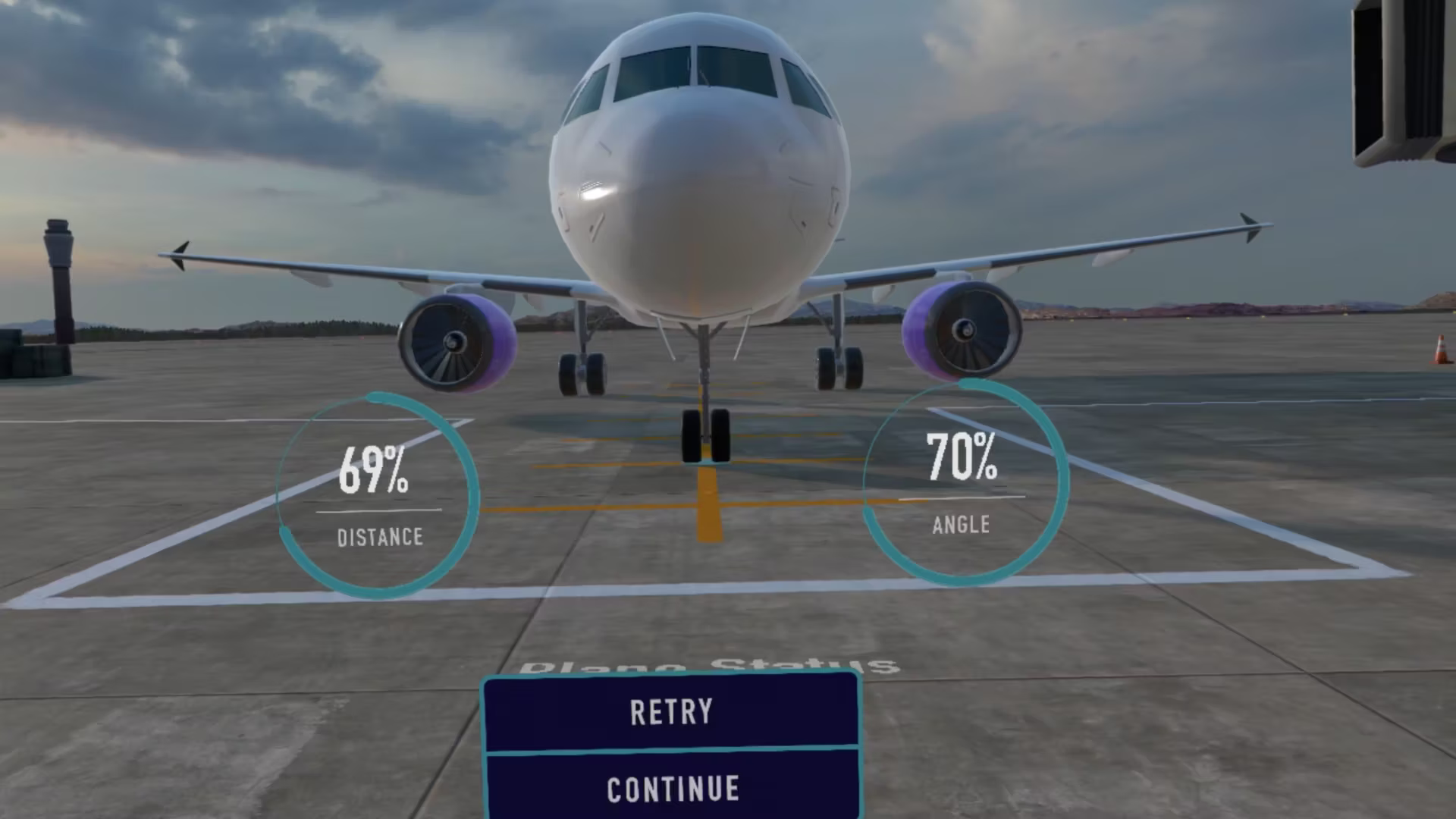9 Industry-Changing Benefits of VR Aircraft Marshalling Training

VR Air Marshalling Training from Optic Sky
Imagine a world where aircraft marshallers can train in the bustling environment of JFK airport one moment and switch to the challenging conditions of a stormy night at Heathrow the next—all without leaving the room. In the rapidly evolving landscape of aviation security, virtual reality (VR) has emerged as a groundbreaking solution that is transforming the aviation industry with unparalleled benefits.
Here are 9 to consider:
Unparalleled Safety with Zero Risk
VR training is like stepping into a thrilling yet completely safe alternate universe. Trainees encounter intense, realistic scenarios where the stakes feel high, but the environment is completely controlled and risk-free. This innovative approach means learning without the fear of real-world consequences—a game-changer in high-stakes aircraft marshalling training.
Cutting Costs, Saving the Planet
Beyond the adrenaline, VR training is a smart economic choice. It slashes traditional training costs, eliminating the need for fuel-guzzling planes and expensive on-site facilities. And there's a green bonus too: By cutting down on fuel consumption and equipment usage, VR is an environmentally conscious approach that aligns with eco-friendly practices.
Immersive Learning: Beyond Just Watching and Listening
Ditch the dull manuals and forget yawning through lectures. VR training is an immersive experience that captivates and engages. Trainees are not just passive listeners but active participants in a digital world, leading to deeper understanding and retention. It’s learning by doing, but with a virtual twist.
✨ See it in Action ✨
Optic Sky VR Air Marshalling Training
Enhanced Learning and Retention
The immersive nature of VR creates a compelling and engaging learning experience. This interactivity not only maintains trainee attention and motivation but can also improve the retention of training material. VR's realistic simulations ensure that trainees are not just learning but experiencing, leading to a deeper understanding and longer-lasting recall of procedures and protocols.
In a study on the subject by PWC, 40% of VR learners saw an improvement in confidence compared to classroom learners, and they were 4 times more focused during training than e-learners. VR learners also felt 3.75 times more emotionally connected to the content than classroom learners, suggesting a deeper level of engagement and potentially better retention.
Customizable and Scalable Training Scenarios
A standout feature of VR training is its adaptability. Scenarios can be tailored to specific needs or situations, such as different airport layouts, aircraft types, and weather conditions. Whether it's navigating through a snowstorm in Moscow or managing a busy summer day in Dubai, VR prepares aircraft marshallers for anything and everything, ensuring that training is relevant and comprehensive. Additionally, VR programs can be easily scaled to accommodate varying numbers of trainees, making it an efficient solution for airlines of all sizes.
Uniform Excellence via Standardized Training
VR ensures a standardized training experience for all aircraft marshallers, offering a uniform training experience across the globe. This consistency is crucial in maintaining high security and operational standards across the airline industry. Every trainee receives the same quality of training, ensuring uniformity in skills and knowledge.
Training Without Borders
Gone are the days of logistical nightmares. VR brings training to the trainees, breaking geographical barriers and offering incredible flexibility. It's a global classroom without the commute, welcoming a wider range of participants and fostering inclusivity like never before.
Real-Time Feedback and Performance Analysis
In the VR world, feedback is instant, like a coach whispering tips in your ear. This immediate guidance accelerates learning, enabling trainees to quickly hone their skills and master the art of aircraft marshalling in a fraction of the usual time. VR technology also allows for rapid and detailed analytics on trainee performance, which helps in quickly identifying areas that need improvement, further accelerating the learning curve. Trainees can immediately rectify mistakes and refine their skills, leading to a more efficient training process.
Preparing for the Unexpected to Master Crisis Situations
Perhaps the most thrilling aspect of VR training is its ability to simulate rare but critical emergency scenarios—including situations that are difficult or impossible to replicate in real life. Trainees face their greatest challenges in a safe virtual space, building confidence and readiness for real-world crises.
A New Horizon in aircraft marshalling Training
VR training is not just an innovation; it's a revolution in the skies. By offering a safe, cost-effective, and highly engaging training environment, VR technology not only enhances the skills and preparedness of aircraft marshallers but also addresses several logistical and operational challenges faced by airlines. As this technology continues to evolve, its role in shaping the future of aircraft marshalling training becomes increasingly vital, ushering in a new era of enhanced safety and efficiency in airline operations.
Request a Demo
Discover how our VR training solutions can benefit your airline.
How We Solved Four Common Museum Challenges with Social Augmented Reality (AR)
explore